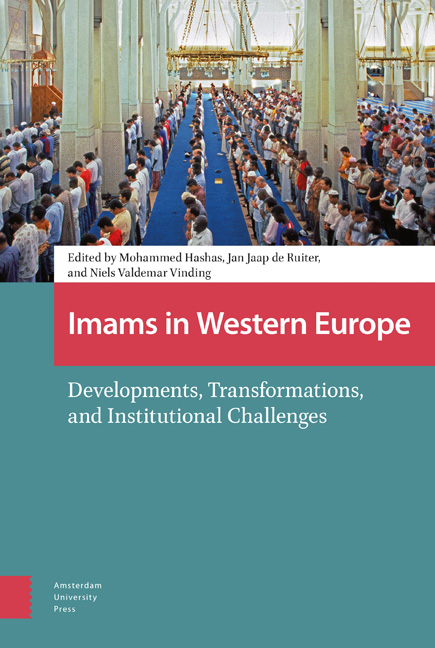1 - Imams in Western Europe: Developments, transformations, and institutional challenges
Published online by Cambridge University Press: 06 January 2021
Summary
Imams in Western Europe
The study of imams, the office of the imamate, and Islamic religious authority is not new, but has an intricate history within the disciplinary confines of Islamic studies. With the advent of what may be called ‘European Islamic thought’ and ‘European Islamic studies,’ the role of imams as agents of religious authority and leadership raises new questions in theology, sociology, anthropology, political science, law, migration studies, and religious and interreligious studies.
This book presents an omnibus academic inquiry into contemporary Islamic religious authority with a focus on imams and the imamate – on which, until now, not much has been written in English. Our ambition is to contribute deeper and more fruitful analyses of the changes and challenges experienced by this source of religious authority in the context of the secular-liberal societies of Western Europe since the Second World War and the subsequent migration and refugee flows. At the same time, this research also serves to highlight secular-liberal institutions and their adaptation, or lack thereof, to the multiculturalism that characterizes Western European states. The social facts of globalization, transnational migration, and various interpretations of secularism have challenged the visibility of religion in the public sphere in Western societies. This has most importantly and urgently required religious authorities to revisit their organization, governance, and internal hierarchy, and Islamic religious authority is no exception. Throughout the Muslim-majority countries and in Europe, Islamic religious authority is still struggling to negotiate its place among the institutions of the modern state in the ‘secular age’ in the words of Charles Taylor (2007). The imamate is one of the institutions that are currently experiencing a shift of roles and functions in society. Scholars and historians of religion in particular are attentive to this shift.
Nomenclature
In the English edition of Hans Wehr's A Dictionary of Modern Written Arabic (1961), the definition of imām is a prayer leader, leader, or master, with the plural a’imma. In its original meaning, the word implies leadership, control, governance, and authority in different aspects of political, spiritual, and theological affairs. According to Hanna Kassis's A Concordance of the Qur’an (1983), the word imām appears twelve times in the Quran, in singular or plural form, with a number of different meanings such as model, example, leader, and guide.
- Type
- Chapter
- Information
- Imams in Western EuropeDevelopments, Transformations, and Institutional Challenges, pp. 19 - 38Publisher: Amsterdam University PressPrint publication year: 2018



